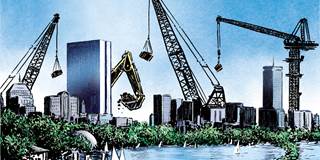Self and the City
Today, when more than half of the world's population lives in urban areas, many critics worry that people are losing their sense of self and community. In fact, cities may be the key to empowering identity in the twenty-first century.
BEIJING – What is the big story of our age? It depends on the day, but if we count by centuries, then surely humanity’s urbanization is a strong contender. Today, more than half of the world’s population lives in cities, compared to less than 3% in 1800. By 2025, China alone is expected to have 15 “mega-cities,” each with a population of at least 25 million. Are social critics right to worry about the atomized loneliness of big-city life?



BEIJING – What is the big story of our age? It depends on the day, but if we count by centuries, then surely humanity’s urbanization is a strong contender. Today, more than half of the world’s population lives in cities, compared to less than 3% in 1800. By 2025, China alone is expected to have 15 “mega-cities,” each with a population of at least 25 million. Are social critics right to worry about the atomized loneliness of big-city life?